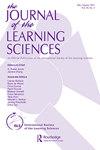Learning engineering: What it is, why I’m involved, and why I think more of you should be
IF 3.9
1区 教育学
Q1 EDUCATION & EDUCATIONAL RESEARCH
引用次数: 0
Abstract
In the article I am responding to (Lee, 2023, this issue and volume), Victor Lee makes the claim that because learning sciences is already an applied science, we do not need another field called Learning Engineering. And because there are currently so many disconnected communities of people writing about learning engineering and calling themselves learning engineers, and many of those people have been advocating for a far less expansive view of what learning entails than the learning sciences community proposes, he wonders whether connecting the learning sciences and learning engineering will diminish the learning sciences. These concerns, I believe, are unfounded; instead, I believe, as I’ve been preaching for the past decade (Kolodner, ISLS keynote, 2012), that we should be more worried that what we are learning in our research is not better appreciated and known by others outside of the learning sciences community. What we have learned about how to support learning and the work we’ve done toward showing what’s possible to implement in schools, should be, but is still little present, in the imagination of policy makers, teachers, parents, administrators, and the designers of curriculum and learning technologies. One reason for that is that too many in the education, academic, and policy “establishments” value lab-based and large-scale experimental research over what we do. Another reason is that we aren’t involved enough in participating in activities that would challenge establishment views. Yet another is that we (the learning sciences community) are not preparing and encouraging our students to take positions in organizations that are designing the newest learning technologies and curriculum products, or in organizations that are helping educators and educational organizations refine their pedagogical approaches, cultures, and social practices.学习工程:它是什么,为什么我参与其中,为什么我认为你们应该更多地参与其中
在我回应的文章(Lee, 2023,本期和卷)中,Victor Lee声称,因为学习科学已经是一门应用科学,我们不需要另一个叫做学习工程的领域。因为目前有很多人在撰写学习工程的文章,称自己为学习工程师,而这些人中的许多人所倡导的关于学习需要什么的观点远没有学习科学界所提出的那么广泛,他想知道将学习科学和学习工程联系起来是否会削弱学习科学。我认为,这些担忧是没有根据的;相反,我相信,正如我在过去十年中一直在鼓吹的那样(Kolodner, ISLS keynote, 2012),我们应该更担心的是,我们在研究中所学到的东西,没有被学习科学社区之外的其他人更好地欣赏和了解。我们所学到的关于如何支持学习的知识,以及我们为展示在学校实施的可能性所做的工作,应该在政策制定者、教师、家长、管理人员以及课程和学习技术设计者的想象中出现,但仍然很少出现。其中一个原因是,在教育、学术和政策“机构”中,有太多的人认为实验室和大规模的实验研究比我们所做的更重要。另一个原因是,我们没有充分参与到挑战现有观点的活动中。另一个原因是,我们(学习科学团体)没有准备好并鼓励我们的学生在设计最新学习技术和课程产品的组织中担任职务,或者在帮助教育者和教育组织改进他们的教学方法、文化和社会实践的组织中担任职务。
本文章由计算机程序翻译,如有差异,请以英文原文为准。
求助全文
约1分钟内获得全文
求助全文
来源期刊

Journal of the Learning Sciences
Multiple-
CiteScore
10.70
自引率
5.30%
发文量
17
期刊介绍:
Journal of the Learning Sciences (JLS) is one of the two official journals of the International Society of the Learning Sciences ( www.isls.org). JLS provides a multidisciplinary forum for research on education and learning that informs theories of how people learn and the design of learning environments. It publishes research that elucidates processes of learning, and the ways in which technologies, instructional practices, and learning environments can be designed to support learning in different contexts. JLS articles draw on theoretical frameworks from such diverse fields as cognitive science, sociocultural theory, educational psychology, computer science, and anthropology. Submissions are not limited to any particular research method, but must be based on rigorous analyses that present new insights into how people learn and/or how learning can be supported and enhanced. Successful submissions should position their argument within extant literature in the learning sciences. They should reflect the core practices and foci that have defined the learning sciences as a field: privileging design in methodology and pedagogy; emphasizing interdisciplinarity and methodological innovation; grounding research in real-world contexts; answering questions about learning process and mechanism, alongside outcomes; pursuing technological and pedagogical innovation; and maintaining a strong connection between research and practice.
 求助内容:
求助内容: 应助结果提醒方式:
应助结果提醒方式:


